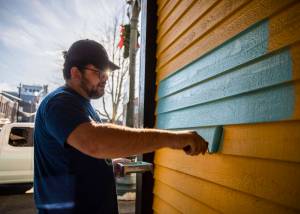Romanians a small, vibrant community in Snohomish County
Published 8:47 pm Wednesday, January 22, 2014
With Christmas a little more than a week away, the men and women in the chorus of Good News Romanian Baptist Church in Everett were enjoying themselves at rehearsal. The women wore colorful blouses and sparkling headbands. The men wore dark suits with red button-down shirts and red ties.
They sang of Jesus Christ’s birth and about his mother — Maria, as she is known among Romanians. These were traditional songs familiar to old and young alike. Pastor Cornel Turcu sang along.
When the chorus sings is the only time when the genders are mixed. Tradition splits men and women into separate sides of the church during services, with women on one side and men on the other.
But as with all immigrant groups, a younger generation is adapting old Romanian traditions for a new home.
One of the church’s bands is an a cappella group, three boys and a girl who sing at different churches in the Seattle area and beyond. They update the traditional songs by including beat-boxing sounds and by singing parts in English as well as Romanian.
Older immigrants look at them strangely, said Aurel Lazar, 23.
Lazar left Romania with his family in 1994 and came to America in 2002, growing up in South Carolina after following the immigration process.
“Music is an important part of our lifestyle” and a way to retain cultural identity, said Lazar, who works at Microsoft and now lives in Kirkland.
Romanian community
Romanians aren’t a big group immigrating to Washington, but they are finding ways to hang on to their identity as they become more integrated into the fabric of American society. According to the U.S. Census Bureau, 906 Romanians live or lived in Snohomish County between 2007 and 2011, most having come in the early 1990s after the country’s communist government was overthrown.
In Snohomish County, the church is one of the focal points for the community, as are a few shops and a Hungarian restaurant in Lynnwood, which serves dishes familiar to Romanians.
Emigrating from Romania two decades ago was far from easy. Nothing here was familiar, including how the society worked. America was the first country, for many of them, with shops full of supplies and no secret police.
“Romanians come from a broken nation, and it is hard to rebuild abroad without being scared and anxious,” said Otilia Vieru-Baraboi, who emigrated from Romania in 2000 when her husband was hired at Microsoft.
Vieru-Baraboi lectures in French and Italian works with a Romanian colleague at the University of Washington and eight other member to create the American Romanian Cultural Society. The Seattle-based group organizes cultural events to show off Romanian culture, and share it with Americans, to build an American-Romanian identity, she said.
“We don’t belong anywhere, so what do you want to do?” she said. “We have to create a place where you’re not a freak, where you fit in, where there is no conflict.”
Adjusting to democracy
Ileana Marin, lecturer in comparative literature, Vieru-Baraboi’s colleague, had the opportunity to come to America on a teaching scholarship. She officially immigrated in 2005 but keeps going back to her home country to teach. Marin uses her teaching skills to help Romanians to integrate.
“Romanians aren’t used to living in a democratic society. There is something we need to learn. We teach these things,” she said.
The Romanian community remains close. This is because of the way they lived in Romania. From 1945 to 1989, the Romanian communist party and longtime dictator Nicolae Ceausescu controlled most aspects of people’s lives. Romanians couldn’t make a move without the government knowing about it. Those who opposed the authority or tried to escape would disappear, be killed or be jailed.
Leo Bot spent time in jail. He left Romania in 1972 as a hippie, when the country was led by Ceausescu. Today he lives in Arlington. He started his own trucking company, Best Overland Trucking, in Everett.
“Romania was really restricted,” he said, “cops arrested you on the street.”
Bot tried to escape the country three times. He failed twice.
“The second time I tried to escape, I was sent to jail,” Bot said. He got caught at the border by a customs official. Even today, it is difficult for him to speak about it.
Life in jail under communism was tough. Prisoners lacked medical care and food, and they were also beaten. In the 1950s, there were an estimated 500,000 political prisoners in Romania, and about 20 percent — about 100,000 — of them died.
Bot finally got out of jail, and Romania. The government didn’t have enough to keep him imprisoned, he said. Once out, he decided to write a letter to the government telling them what was wrong about human rights in Romania.
They returned with an ultimatum.
“A police officer (showed up at home), gave me a passport and told me I had 24 hours to leave the country” he said.
He took the first train to Italy. Later, he made his way through different European countries before ending up in Snohomish County 10 years ago.
Today, he helps other Romanian immigrants learn enough English to be able to fill in forms and find jobs.
Gathering the community
“It is important to gather the community,” Bot said. “They know what you are coming from; it’s important for someone to have your back.”
Noticing that the local Romanian community was meeting mostly in churches, Vieru-Baraboi and Marin decided to create their association.
“Churches organize more events like gatherings, celebrations and fairs, which we won’t do really,” Marin said. “We want to fill in the gap.”
Instead, ARCS intends to teach about Romanian culture and to include other Balkan immigrants in their programs.
James Augerot, professor emeritus of slavic languages and literature at the University of Washington, spent two years in Romania, from 1964 and 1966. He went as a teacher and saw Ceausescu take power.
“Many of them don’t have happy memories about their home country,” Augerot said.
Every time there was historical change in Europe, people took the occasion to run away.
Just as both world wars caused people to emigrate from Europe, people got out as soon as possible after Ceausescu and his wife were executed at the end of the Cold War, Augerot said.
The largest group in metro Seattle represents those allowed to leave during communism as well as those who got out after the Ceausescus fell.
“Most of them, just in my acquaintances, emigrate because some relatives moved here before, so they have a connection,” he said.
First and second waves
According to Augerot, there are two main groups of emigrants.
A first emigrated mostly for religious reasons.
Ceausescu didn’t allow religious practice. As Vieru-Baraboi explained, to be able to be a political emigrant during communism, you had to be religiously persecuted. Minorities, such as Baptists, could escape the country for this reason. But those belonging to the Romanian Orthodox community — most Romanians are orthodox — couldn’t legally leave.
Churches encouraged Romanians to come, and still do. Missionaries go to Romania, asking congregants to come and build churches here, Augerot said. Churches also send missionaries back to Romania to convince people to join them.
The second group of immigrants was brought by the digital industry or medicine.
Turcu, pastor of Everett’s Good News Romanian Baptist Church, noted that most American Romanians in Washington work for Microsoft or in senior care.
“After an adjustment period most of them become very valuable employees or develop their enterprises,” Turcu said. “The quality of education in Romania is well recognized in Europe and the rest of the world, and reputable companies are recruiting their work force from the young talent in Romania.”
One benefit of communism
This was an advantage of communism, Vieru-Baraboi said. Everyone was forced to go to school and no one remained illiterate. After communism, the country’s level of education remained high.
“Microsoft was recruiting in Romania after communism. It started in the early 1990s,” she said.
Her husband and his classmates at the university of Lasi were all offered jobs by Microsoft after they graduated, she said. Many intellectuals left the country after the massive recruiting, and they keep leaving, she added.
A similar thing happened in medicine. European medical systems hired many Romanians, and many doctors left, Augerot said. “In the medicine field, Romanians are cheap employees and great talents,” he said.
Other Romanians found their way as senior care workers. It was a natural adaptation, Marin said. In Romania, generations of families learned how to take care of each other, so it is something they gravitate to in America, too. There are Romanian-operated senior living homes in Lynnwood and Bothell.
Family for Romanians, Augerot said, is much more important than in the U.S.
“They are very loyal to their mother and father. They are perhaps over-concerned with their children. They really take care of their children, really extremely sometimes,” Augerot said.
Vieru-Baraboi explains it another way: “Those are the people you trust first before the institution. This is our network, how we survive.”
Sharing Romanian culture
ARCS hopes to focus on introducing another part of that heart — Romanian art and culture — to Americans.
“We want to help Romanian artists to be more visible. I don’t think there is enough translation from Romanian to other languages, especially in English,” Marin said.
Romanian, like many other languages, isn’t taught at Washington universities. But at UW, the Romanian community has been invited to hold classes to teach the language, which is one of the Romance languages with French, Italian, Spanish and Portuguese.
It is important to learn the language if Romanians want their children and grandchildren to keep a bit of their culture, Marin said.
An annual film festival in November showed the new wave of Romanian films, some of which have won international prizes, such as last year’s award-winning “Child’s Pose.” It tells the story of a mother who tries to control her adult son’s life and help him avoid prison for manslaughter. Also shown was “4 Months, 3 Weeks and 2 Days,” about a woman helping a friend seeking an illegal abortion in the 1980s. The film earned a Palme d’Or in 2007 at Cannes.
“Cinema and music are the only languages that go beyond the borders. It is about communicating who we are to other people,” Vieru-Baraboi said.
ARCS will host its first musical event from 7 to 10 p.m. Friday. That’s the date when, in 1859, the independent principalities of Moldavia and Wallachia united to make the first country of Romania.
A band from Bucharest will play Romanian and Balkan music, and there will be a photography exhibit of Romania and Washington by photographers from Romania. The event will be held at Cafe Solstice, 4116 University Way, Seattle.
“We are American Romanian now. We are not Romanian anymore,” Vieru-Baraboi said. “We are both, and our children are hybrid.”




